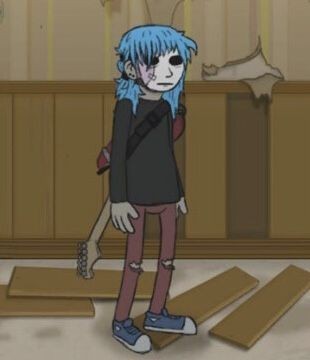Krispynotkreme - Krispy
More Posts from Krispynotkreme and Others
Day 3: Steve Harrington
you can pry bi Steve harrington from my cold dead hands






THE TRAGEDY OF HAYAKAWA AKI (insp by this post)


designed two posters for The Mandela Catalogue, really happy how they came out.
my favourite type of character is the child tortured by interdimensional beings






Writing Dreams
There is nothing more frustrating than reading a tense, drama-packed scene where the plot takes a completely unexpected turn, a character in the midst of an arc makes a pivotal realization, or heck, someone dies, only to read the next sentence and discover that none of it was real -- it was, in fact, all a dream.
Yet writers keep using this trope. It's most common for flashbacks, recaps, foreshadowing, and showing internal conflict for characters undergoing character arcs. Sometimes it works. Most of the time, it elicits groans from frustrated readers asking, why did I have to read this if it is not real?
I think the dream trope falls flat for four main reasons.
The Let Down: Dreams, especially nightmares, have a tendency to be fast-paced high-action scenes where IMPORTANT character and plot moments happen. The reader gets invested. Especially if the dream involves a major plot twist, loss, failure, betrayal, or character death, the reader has now adjusted their expectations for the story. They are wondering, how the heck are the characters going to move forward after this setback?? and they've just been delivered an emotional gut-punch. But oh! None of that was actually real. The characters are all safe and the plot is still going as planned. The writer has built up all this tension, the stakes are higher than ever... then, suddenly, all it just disappears. What a let down!
It Came to Them in a Dream: A character is going through (or about to start) an arc, such as a redemption arc, or they are being forced to make a difficult decision. Suddenly, they have a dream that reveals to them a moral conflict they didn't realize they were having, gives them a realization they never would have come to on their own, or just tells them the right answer to their difficult choice. Instead of letting these characters come to these realizations through their own conscious actions, and letting them make decisions (both good and bad) that eventually teach them lessons, it all came to them in a dream! Yes, dreams are a fast way to spur character growth and an easy way to share information. But this method leaves the characters as passive witnesses to their own story. It robs them of agency. And this is rather boring to read.
Why now? Dreams used to show backstory or recap events can also fall into the trap of robbing characters of agency. Unless the memory has been triggered by a recent event, why is the character suddenly dreaming of this now? Why not a month ago? Why not a month from now? Why not never? It makes it feel like there is some mysterious force controlling the events of the story, making sure that things happen in a certain order. It begs the question, if the character didn't randomly have this dream, would the story have happened the way it did?
It Makes Too Much Sense: The dream doesn't feel like a dream. Things that happen in the dream are too logical, or worse yet, the dream is a completely accurate memory, undistorted by time or the biases of the character remembering. This is the least important of the four points, but it can still mess with a reader's suspension of disbelief, and misses a good opportunity to explore the biases of a character and how they view the world around them.
But this doesn't mean the trope can't ever be used. You just have to makes sure your dreams don't create the above problems for your story.
Oh shit, this was in my dream! Dreams can be a great way to build up tension for a climactic moment, so long as the dream is directly related to an event that happens later. You can have death and betrayal and failure in your dreams, so long as the dreams are used to build up to the moment when one of these things might actually happen. Use dreams to convey to worst-case scenario so that your readers understand the stakes and are genuinely worried when the moment the character has dreamed about starts to come true.
Keep the pace: To avoid letting down your readers with a fast-paced dream that has no impact on the plot, make sure the dream does not interrupt your pacing. If the scenes directly around your dream are slow-paced, don't throw in a fast-paced dream. It will feel like a cheap attempt to keep the reader interested. If you have a faster-paced dream, have it happen as tension is building towards a major moment. If your dream is one of the most climatic parts of the story, it needs to happen right before -- perhaps segueing directly into -- one of the story's climaxes. You can also stick fast-paced dreams directly after dramatic scenes if you want to show how the scene impacted a character. If something just terrified your character, they are probably having a nightmare about it.
Don't introduce anything new: If you must use a dream as part of a character arc or arc leading to a major decision, have the dream be the effect, not the cause. A character already questioning their morality, slowly coming to a realization, or grappling with a choice will likely reflect on it in their dreams. But, dreams should not introduce information, ideas, or opinions that the character does not know/has not already entertained while conscious. Likewise, dreams can be an effective tool to show characters mulling over dilemmas as possible outcomes, but any new decisions should be made while the character is conscious.
Huh, that reminds me of... If you want to show backstory or a recap through a dream, have something inspire the dream such as a recent event, a reunion with a character that will later appear in the dream, or even a familiar smell or food that has something to do with the dream. The thing that links this moment in the past to the present can be an excellent place for symbolism.
The Divine Forces Spoke to ME! Make the dream the inciting incident. If you must have a character arc inspired by a random dream, put it right at the beginning of the story. Make the dream the thing that motivates the character to be part of the plot in the first place. Don't take an existing character with established motivations and suddenly change them because of a dream.
One time I dreamt... Make the dream illogical. You can use this to make it scarier (ex. the villain turns into a werewolf the size of a skyscraper with human flesh stuck in his fangs for no reason), or you can use it for comedic effect. You can also use it to convey information about the character having the dream. (If the character's little brother randomly shows up on the battlefield eating all their candy, you can tell what kind of relationship the siblings have.)
If you are writing sci-fi or fantasy, there are other clever ways to get around some of the pitfalls of the dream trope. But there are also new pitfalls to fall into. You can get around the "why now?" and "it came to them in a dream" problems by having another character plant the dream in their head Darth Sidious-style. But you can also run the risk of having " unexplained mysterious forces" doling out random, useful information for no apparent reason. If you want an "unexplained mysterious force" like fate or "the gods" to be an active role in a story, you have to write it like a character -- with internally consistent motivations and reasons for why it chooses to interfere sometimes but not others. Even if you never explain it, it must be consistent, and that consistency must be deducible from the force's actions in the story.

Dare I say, slay
Since its that time of year again, I’ve been thinking about Over the Garden Wall, and I think one of my favorite things about it is that, other than the fact that they’re lost in some strange woods, their problems are so normal. Like, in so many shows the problems are things like “both of my parents are dead and their last wish was for me to do this really emotionally taxing life long quest” or whatever, but Wirts biggest problem is that he cant tell a girl that he likes her, and that his mom somewhat recently remarried, and his half brother is kind of annoying in that little kid way. They’re just such normal problems, and it feels like its one of the few heroes journey sort of tales where the main character is just some kid. Hes not some chosen one, hes not the most popular kid at school, but hes obviously not outcast because pretty much everyone who sees him in the Halloween episode greets him in a friendly way and try to include him. He’s just a normal kid, but he still has these unique little traits that make him interesting, like that he plays clarinet, and writes poetry, and is kind of a pushover but is also really passive aggressive when he wants to be. Its just such a good show, and every time I rewatch it I find another little thing that I love about it.






Chainsaw Man Cards
-
 wings-of-life reblogged this · 4 days ago
wings-of-life reblogged this · 4 days ago -
 iwah9 reblogged this · 5 days ago
iwah9 reblogged this · 5 days ago -
 inthesuitcase liked this · 1 month ago
inthesuitcase liked this · 1 month ago -
 sasukebutmorebratty reblogged this · 2 months ago
sasukebutmorebratty reblogged this · 2 months ago -
 sasukebutmorebratty liked this · 2 months ago
sasukebutmorebratty liked this · 2 months ago -
 silver-bees reblogged this · 2 months ago
silver-bees reblogged this · 2 months ago -
 silver-bees liked this · 2 months ago
silver-bees liked this · 2 months ago -
 brunette-weasel reblogged this · 2 months ago
brunette-weasel reblogged this · 2 months ago -
 brunette-weasel liked this · 2 months ago
brunette-weasel liked this · 2 months ago -
 m-thballs reblogged this · 2 months ago
m-thballs reblogged this · 2 months ago -
 walrus-bucket liked this · 2 months ago
walrus-bucket liked this · 2 months ago -
 carpet-in-space reblogged this · 2 months ago
carpet-in-space reblogged this · 2 months ago -
 carpet-in-space liked this · 2 months ago
carpet-in-space liked this · 2 months ago -
 lorenzoinorbit liked this · 2 months ago
lorenzoinorbit liked this · 2 months ago -
 modelultima liked this · 2 months ago
modelultima liked this · 2 months ago -
 sprinkleglitz reblogged this · 2 months ago
sprinkleglitz reblogged this · 2 months ago -
 artkiddisease liked this · 2 months ago
artkiddisease liked this · 2 months ago -
 opal-in-orbit liked this · 2 months ago
opal-in-orbit liked this · 2 months ago -
 candlaze liked this · 2 months ago
candlaze liked this · 2 months ago -
 carouselcometh liked this · 2 months ago
carouselcometh liked this · 2 months ago -
 fluffygiraffe liked this · 2 months ago
fluffygiraffe liked this · 2 months ago -
 g-man-17 reblogged this · 2 months ago
g-man-17 reblogged this · 2 months ago -
 g-man-17 liked this · 2 months ago
g-man-17 liked this · 2 months ago -
 justalittlebitwitchy liked this · 2 months ago
justalittlebitwitchy liked this · 2 months ago -
 kingcervix reblogged this · 2 months ago
kingcervix reblogged this · 2 months ago -
 daemonbreath liked this · 2 months ago
daemonbreath liked this · 2 months ago -
 roombaroob reblogged this · 2 months ago
roombaroob reblogged this · 2 months ago -
 roombaroob liked this · 2 months ago
roombaroob liked this · 2 months ago -
 wizardprime reblogged this · 2 months ago
wizardprime reblogged this · 2 months ago -
 popping-ivy reblogged this · 2 months ago
popping-ivy reblogged this · 2 months ago -
 clankit liked this · 2 months ago
clankit liked this · 2 months ago -
 twasmayfield liked this · 2 months ago
twasmayfield liked this · 2 months ago -
 hidingoutbackstage reblogged this · 2 months ago
hidingoutbackstage reblogged this · 2 months ago -
 hidingoutbackstage liked this · 2 months ago
hidingoutbackstage liked this · 2 months ago -
 twilitfossil reblogged this · 2 months ago
twilitfossil reblogged this · 2 months ago -
 confusionnation5 liked this · 2 months ago
confusionnation5 liked this · 2 months ago -
 the-ineffable-queer liked this · 2 months ago
the-ineffable-queer liked this · 2 months ago -
 anastasiablackthorne reblogged this · 2 months ago
anastasiablackthorne reblogged this · 2 months ago -
 anastasiablackthorne liked this · 2 months ago
anastasiablackthorne liked this · 2 months ago -
 pluggedintosaverockandroll reblogged this · 2 months ago
pluggedintosaverockandroll reblogged this · 2 months ago -
 pluggedintosaverockandroll liked this · 2 months ago
pluggedintosaverockandroll liked this · 2 months ago -
 theladyofthedarkness liked this · 2 months ago
theladyofthedarkness liked this · 2 months ago -
 sunb3amhollow reblogged this · 2 months ago
sunb3amhollow reblogged this · 2 months ago -
 theabsolutemagicpotato reblogged this · 2 months ago
theabsolutemagicpotato reblogged this · 2 months ago -
 theabsolutemagicpotato liked this · 2 months ago
theabsolutemagicpotato liked this · 2 months ago -
 eli-xr8 reblogged this · 2 months ago
eli-xr8 reblogged this · 2 months ago -
 thenatsolstice reblogged this · 2 months ago
thenatsolstice reblogged this · 2 months ago -
 mynroli liked this · 2 months ago
mynroli liked this · 2 months ago












